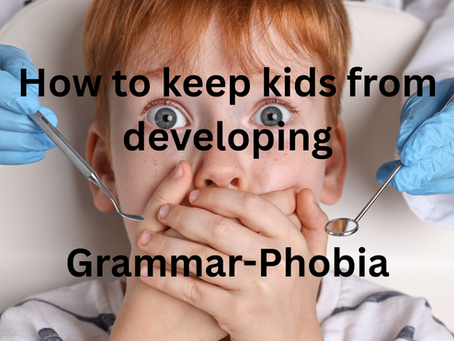top of page


How to keep kids from hating grammar
But grammar is much more than dead, dogmatic rules. When taught with passion and explained as the means to creating beautiful, concise, creative, and coherent expressions, grammar becomes a collection of powerful, transformational tools instead of a series of dry, book-bound rules.
Brian Vieira
Jul 31, 20252 min read


How to help kids become sentence smart
To be sentence smart means having the ability to read and decode a sentence’s meaning by understanding the purpose, position, and interrelationship of its parts. Sentence smart students can recognize, organize, and analyze complex sentences.
Brian Vieira
Jul 30, 20252 min read


Teaching nouns in an exciting way
An exciting way to teach nouns
Brian Vieira
Jun 13, 20251 min read


Simple definitions of the parts of speech
Simple definitions of the parts of speech
Brian Vieira
Jun 12, 20252 min read


How to teach nouns in an exciting way
This video will show you how to get kids excited about learning nouns
Brian Vieira
Jun 11, 20251 min read


How the parts of speech help students improve their reading and writing skills
How the parts of speech can improve reading comprehension
Brian Vieira
Jun 11, 20251 min read


How does grammar help students with reading comprehension?
The most important element in education is reading comprehension; and the most important element in reading comprehension is sentence...
Brian Vieira
Jun 11, 20251 min read
Brian Vieira
Oct 29, 20240 min read


Short Vowel Sounds for Kids
TAG the Sylla-Bear makes learning vowels exciting
Brian Vieira
Oct 28, 20240 min read


Tired of giving your students boring spelling lists? Try analytical spelling!
Why analytical spelling is superior to old-school spelling lists
Brian Vieira
Oct 25, 20241 min read


The fatal flaw in balanced literacy
The critical flaw in all unsystematic whole-language approaches to early literacy is the misconception that learning to read is as...
Brian Vieira
Oct 7, 20241 min read


What do Coke and Pepsi have to do with teaching literacy?
Literacy is not a taste test. We must do what the science says is best.
Brian Vieira
Oct 2, 20241 min read


What is the best way to teach phonics?
Should phonics be taught systematically or unsystematically?
Brian Vieira
Sep 30, 20242 min read


No such thing as balanced literacy
There is no such thing as "balanced literacy." Phonics instruction is either systematic or unsystematic. The National Reading Panel...
Brian Vieira
Sep 27, 20241 min read


The most important prefixes
Just seven prefixes unlock 57% of all prefixed words.
Brian Vieira
Sep 25, 20241 min read


What are vowels, syllables, and consonants?
Science of Reading 101 (Part II) The art of teaching is taking the complex and making it simple, practical, and applicable for students....
Brian Vieira
Sep 23, 20243 min read


What is phonics?
In this conversation, Brian Vieira discusses the critical components of helping children overcome reading difficulties.
Brian Vieira
Sep 17, 20241 min read


How phonological awareness helps kids overcome reading difficulties
Sound Bites
"Phonological awareness is the first stage of reading success."
"Phonological awareness begins from birth."
Brian Vieira
Sep 6, 20241 min read


From sound to sight: how to teach reading right
As it is currently used, the term sight word refers to a set of irregularly spelled words students are taught to memorize. However, the...
Brian Vieira
Aug 29, 20242 min read


How to use your students' names as an effective spelling tool
how to use names as effective spelling tools
Brian Vieira
Aug 19, 20242 min read
bottom of page
